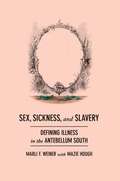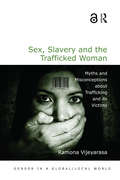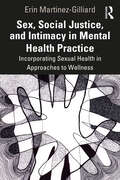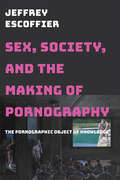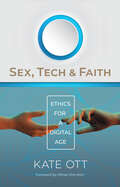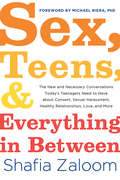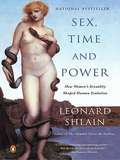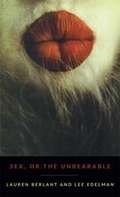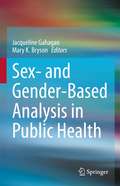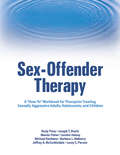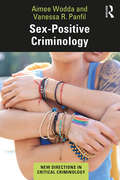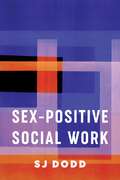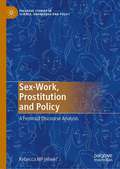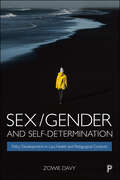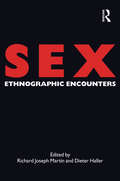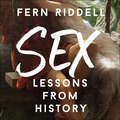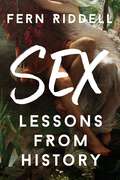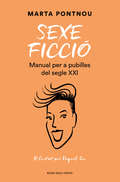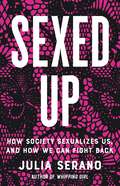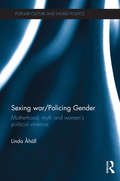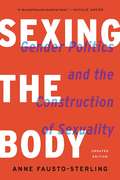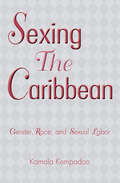- Table View
- List View
Sex, Sickness, and Slavery: Illness in the Antebellum South
by Mayzie Hough Marli F. WeinerMarli F. Wiener skillfully integrates the history of medicine with social and intellectual history in this study of how race and sex complicated medical treatment in the antebellum South. Sex, Sickness, and Slavery argues that Southern physicians' scientific training and practice uniquely entitled them to formulate medical justification for the imbalanced racial hierarchies of the period. Challenged with both helping to preserve the slave system (by acknowledging and preserving clear distinctions of race and sex) and enhancing their own authority (with correct medical diagnoses and effective treatment), doctors sought to understand bodies that did not necessarily fit into neat dichotomies or agree with suggested treatments. Focusing on Southern states from Virginia to Alabama, Weiner examines medical and lay perspectives on the body through a range of sources, including medical journals, notes, diaries, daybooks, and letters. These personal and revealing sources show how physicians, medical students, and patients--both free whites and slaves--felt about vulnerability to disease and mental illnesses, how bodily differences between races and sexes were explained, and how emotions, common sense, working conditions, and climate were understood to have an effect on the body. Physicians' authority did not go uncontested, however. Weiner also describes the ways in which laypeople, both black and white, resisted medical authority, clearly refusing to cede explanatory power to doctors without measuring medical views against their own bodily experiences or personal beliefs. Expertly drawing the dynamic tensions during this period in which Southern culture and the demands of slavery often trumped science, Weiner explores how doctors struggled with contradictions as medicine became a key arena for debate over the meanings of male and female, sick and well, black and white, North and South.
Sex, Slavery and the Trafficked Woman: Myths and Misconceptions about Trafficking and its Victims (Gender in a Global/Local World)
by Ramona VijeyarasaSex, Slavery and the Trafficked Woman is a go-to text for readers who seek a comprehensive overview of the meaning of ’human trafficking’ and current debates and perspectives on the issue. It presents a more nuanced understanding of human trafficking and its victims by examining - and challenging - the conventional assumptions that sit at the heart of mainstream approaches to the topic. A pioneering study, the arguments made in this book are largely drawn from the author’s fieldwork in Ukraine, Vietnam and Ghana. The author demonstrates to readers how a law enforcement and criminal justice-oriented approach to trafficking has developed at the expense of a migration and human rights perspective. She highlights the importance of viewing trafficking within a broad spectrum of migratory movement. The author contests the coerced, female victim archetype as stereotypical and challenges the reader to understand trafficking in an alternative manner, introducing the counterintuitive concept of the ’voluntary victim’. Overall, this text provides readers of migration and development, gender studies, women’s rights and international law a comprehensive and multidisciplinary analysis of the concept of trafficking.
Sex, Social Justice, and Intimacy in Mental Health Practice: Incorporating Sexual Health in Approaches to Wellness
by Erin Martinez-GilliardThis book aims to equip mental health professionals to integrate discussions of sexual identity, health, wellness, and intimacy into the scope of their client’s mental health, ensuring they are well-prepared to incorporate sexual functioning into core assessment, interventions, and treatment. We exist in societies that are scared to discuss sexual health, identity, and relationships, and the stigma surrounding these topics saturates our mental health professions. Sex, intimacy, and sexual identity have historically been relegated as “specialized” topics when training new clinicians, which has led to professionals feeling unable and unskilled to speak about a core part of their client’s psychological, biological, physical, and relational health. Viewing this as a social justice issue, this book addresses a movement in the counseling field to incorporate sexual health into therapy as well as providing new ways of foundational teaching. Chapters begin exploring the history of sex therapy and the problems that have previously been addressed as concerns for the sex therapy field only, before discussing issues surrounding transference and countertransference. Encouraging self-reflection regarding values, bias, and attitudes related to topics of sexuality, the book moves to discussing strategies and integrative approaches to co-occurring conditions, such as trauma, diagnosis of sexual difficulties, stigma and societal messages, biopsychosocial treatment, networking, and coordination of care and spiritual health and healing. Including journaling exercises, assessment tools and case studies of how to weave approaches addressing sexual concerns into practice, this book will provide graduate courses and continuing education instructors with the core material to assist the training and development of future and established professionals.
Sex, Society, and the Making of Pornography: The Pornographic Object of Knowledge
by Jeffrey EscoffierHardcore pornographic films combine fantasy and real sex to create a unique genre of entertainment. Pornographic films are also historical documents that give us access to the sexual behavior and eroticism of different historical periods. This book shows how the making of pornographic films is a social process that draws on the fantasies, sexual scripts, and sexual identities of performers, writers, directors, and editors to produce sexually exciting videos and movies. Yet hardcore pornographic films have also created a body of knowledge that constitutes, in this digital age, an enormous archive of sexual fantasies that serve as both a form of sex education and self-help guides. Sex, Society, and the Making of Pornography focuses on sex and what can be learned about it from pornographic representations.
Sex, Tech, and Faith: Ethics for a Digital Age
by Kate OttA values-based, shame-free, pleasure-positive discussion of Christian ethics in response to a range of pressing issues in the digital age—including online pornography, dating apps, sexting, virtual-reality hookups, and sex robots.Digital innovation has rapidly changed the landscape of sexual experience in the twenty-first century. Rules-based sexual ethics, subscribed to by many Christians, are unable to keep up with new developments and, more often than not, seem effective at little other than generating shame.Progressive ethicist Kate Ott steps into this void with an expansive yet nuanced approach that prioritizes honesty and discernment over fear and judgment. Rather than producing a list of don&’ts, Ott considers the possibilities alongside the potential harm in everything from the use of internet porn to the practice of online dating to human-robot intimacy. With the aid of thought-provoking anecdotes and illuminating research, Ott invites readers to wrestle with the question of how to practice a just and flourishing sexuality in the digital age—and does so by drawing on core values of the Christian tradition.A rich resource for both individuals and groups, Sex, Tech, and Faith includes discussion questions at the end of each chapter for those considering these issues in community, as well as extensive youth study guides for parents, pastors, and teachers in need of age-appropriate means of beginning these difficult conversations with teens. Readers of all backgrounds and identities will be challenged to consider how their choices and habits in the digital world can lead to sexual health, wholeness, dignity, and fulfillment—for themselves and those in relationship with them.
Sex, Teens, and Everything in Between: The New and Necessary Conversations Today's Teenagers Need to Have about Consent, Sexual Harassment, Healthy Relationships, Love, and More
by Shafia ZaloomThe only book you need to start a conversation with your kids about sexual harassment, consent, #metoo, and moreMany American teens are steeped in a culture that sends unsettling messages about sex, through everything from politics to music to the normalization of porn. In today's environment, it's crucial that teens be able to ask hard questions about how to take care of themselves, make decisions that reflect their values, and stay safe. In Sex, Teens, and Everything in Between, veteran teen sex educator and mother of three Shafia Zaloom helps you discuss a wide variety of sex-related topics with your teens, including: How to get and give consent What it means to have "good" sex How to help prevent sexual harassment and assault How to stay safe in difficult situations The legal consequences of sexual harassment and assault, and what to do if a teen experiences assault or is accused of it Stories from survivors of sexual assaultApproachable, engaging, and with real-life scenarios and discussion questions in every chapter, Sex, Teens, and Everything in Between is a must-have resource that gives parents and educators the tools they need to have meaningful conversations with teens about what sex can and should be.
Sex, Time, and Power: How Women's Sexuality Shaped Human Evolution
by Leonard ShlainAs in the bestselling The Alphabet Versus the Goddess, Leonard Shlain’s provocative new book promises to change the way readers view themselves and where they came from. Sex, Time, and Power offers a tantalizing answer to an age-old question: Why did big-brained Homo sapiens suddenly emerge some 150,000 years ago? The key, according to Shlain, is female sexuality. Drawing on an awesome breadth of research, he shows how, long ago, the narrowness of the newly bipedal human female’s pelvis and the increasing size of infants’ heads precipitated a crisis for the species. Natural selection allowed for the adaptation of the human female to this environmental stress by reconfiguring her hormonal cycles, entraining them with the periodicity of the moon. The results, however, did much more than ensure our existence; they imbued women with the concept of time, and gave them control over sex—a power that males sought to reclaim. And the possibility of achieving immortality through heirs drove men to construct patriarchal cultures that went on to dominate so much of human history. From the nature of courtship to the evolution of language, Shlain’s brilliant and wide-ranging exploration stimulates new thinking about very old matters. .
Sex, or the Unbearable
by Lee Edelman Lauren BerlantSex, or the Unbearable is a dialogue between Lauren Berlant and Lee Edelman, two of our leading theorists of sexuality, politics, and culture. In juxtaposing sex and the unbearable they don't propose that sex is unbearable, only that it unleashes unbearable contradictions that we nonetheless struggle to bear. In Berlant and Edelman's exchange, those terms invoke disturbances produced in encounters with others, ourselves, and the world, disturbances that tap into threats induced by fears of loss or rupture as well as by our hopes for repair.Through virtuoso interpretations of works of cinema, photography, critical theory, and literature, including Lydia Davis's story "Break It Down" (reprinted in full here), Berlant and Edelman explore what it means to live with negativity, with those divisions that may be irreparable. Together, they consider how such negativity affects politics, theory, and intimately felt encounters. But where their critical approaches differ, neither hesitates to voice disagreement. Their very discussion--punctuated with moments of frustration, misconstruction, anxiety, aggression, recognition, exhilaration, and inspiration--enacts both the difficulty and the potential of encounter, the subject of this unusual exchange between two eminent critics and close friends.
Sex- and Gender-Based Analysis in Public Health
by Jacqueline Gahagan Mary K. BrysonThis book is the first to focus on sex- and gender-based analysis (SGBA) in public health, addressing the dearth of thinking, practice, and publication on SGBA and public health. The Canadian government is a global leader in seeking gender equity and mandating SGBA in federal initiatives, programs, and policies, continuing to advocate for the uptake of SGBA. However, there is differential uptake of SGBA in many fields, and public health is lagging behind. This book analyses the movement toward SGBA in Canada and internationally, highlighting some key examples of public health concern such as HIV/AIDS and tobacco use.An international group of experts in the fields of SGBA, public health, program evaluation, policy development, and research comprise the authorship of the book. Collectively, the team of authors and editors have deep expertise in SGBA and public health nationally and internationally and have published widely in the SGBA literature.Topics explored among the chapters – organized under three thematic content areas: the SGBA terrain in public health, illustrative examples from the field, and the implications of SGBA in public health – include:Sex- and Gender-Based Analyses and Advancing Population HealthBeyond “Women’s Cancers”: Sex and Gender in Cancer Health and CareWomen, Alcohol and the Public Health Response – Moving Forward from Avoidance, Inattention and Inaction to Gender-Based DesignUnderstanding Pandemics Through a Sex- and Gender-Based Analysis Plus (SGBA+) LensSex- and Gender-Based Analysis and the Social Determinants of Health: Public Health, Human Rights and Incarcerated YouthGender-Transformative Public Health ApproachesSex- and Gender-Based Analysis in Public Health is an important text for graduate-level students and trainees as well as public health practitioners in a variety of disciplines such as health promotion, nursing, health administration, public administration, sociology, political science, gender and women’s studies. The book also is an essential resource for specialists in public health policy, programming, research, and evaluation.
Sex-Offender Therapy: A "How-To" Workbook for Therapists Treating Sexually Aggressive Adults, Adolescents, and Children
by Rudy Flora Joseph T. Duehl Wanda Fisher Sandra Halsey Michael Keohane Barbara L. Maberry Jeffrey A. McCorkindale Leroy C. ParsonGroundbreaking information for treating sex offenders Sexual abuse, sexual addiction, and sexual offending have become a significant clinical problem. Successfully treating these disorders is the first step toward preventing future victims. Sex-Offender Therapy is a practical workbook for clinicians who deal with sexually aggressive adults, adolescents, and children. This invaluable professional resource focuses on how to treat patients—male and female—impaired by sexual addiction, sexual disorders, sex offending, and other sexual misconduct behaviors. Designed as an accessible step-by-step guide, Sex-Offender Therapy features case studies, work exercises, and clinical suggestions that help to walk the reader through a sexual disorders program. With a wealth of therapeutic interventions, as well as information on polygraph testing and the FDA-approved plethysmograph, this unique text breaks new ground. Additionally, this detailed volume not only presents clinical definitions of all the sexual disorders but goes beyond patient features and evaluation to look at useable, concrete methods for lasting treatment. Topics discussed in Sex-Offender Therapy include: problems, stress, and boundary setting transference and countertransference sexual recovery therapy and its techniques acknowledgement and responsibility the stand-up presentation and victim empathy cycles of offending using the four phases as a relapse prevention format working with the difficult offender trauma in adult, adolescent, and child offenders the cost of offending antisocial disordered patients triggers clinical interviewing and report writing adult and juvenile psychosexual evaluations polygraph testing treatment of sexually aggressive youths defense behaviors group therapy and many more!Informative, practical, and user-friendly, Sex-Offender Therapy is a vital resource for patients and their families, beginning or advanced therapists, attorneys, criminal justice personnel, human service caseworkers, judges, law enforcement, legislators, probation officers, prosecutors, educators, students, researchers, and mental health professionals.
Sex-Positive Criminology (New Directions in Critical Criminology)
by Vanessa R. Panfil Aimee WoddaSex-Positive Criminology proposes a new way to think about sexuality in the fields of criminology and criminal justice. Sex-positivity is framed as a humanizing approach to sexuality that supports the well-being of self and others. It is rooted in the principle of active and ongoing consent, and it encourages perspectives that value bodily autonomy, the right to access education, and respect for sexual difference. In this book, the authors argue that institutions such as prisons, schools, and healthcare facilities, as well as agents of governments, such as law enforcement, correctional officers, and politicians, can unduly cause harm and perpetuate stigma through the regulation and criminalization of sexuality. In order to critique institutions that criminalize and regulate sexuality, the authors of Sex-Positive Criminology examine case studies exploring the criminalization of commercial sex and related harm (at the hands of law enforcement) experienced by those who sell sex. They investigate sex education in schools, reproductive justice in communities and institutions, and restrictions on sexuality in places like prisons, jails, juvenile detention, and immigrant detention facilities. They look into the criminalization of BDSM practices, and address concerns about young people’s sexuality connected to age of consent and privacy violations. The authors demonstrate how a sex-positive perspective could help criminologists, policymakers, and educators understand not only how to move away from sex-negative frameworks in theory, policy, and practice, but how sex-positive criminological frameworks can be a useful tool to reduce harm and increase personal agency. Written in a clear and direct style, this book will appeal to students and scholars in criminology, sociology, sexuality studies, cultural studies, criminal justice, social theory, and all those interested in the relationship between sexuality and the crimino-legal system.
Sex-Positive Social Work
by SJ DoddSocial workers engage with sex and sexuality in all kinds of practice settings and with a variety of client populations. However, conversations about healthy sexuality and sexual well-being are all but absent from social work literature, education, and practice. Many social work professionals have internalized sociocultural taboos about talking about sexuality and tend to avoid the topic in their practice.This book provides an overview of key sexuality-related topics for social workers from a sex-positive perspective, which encourages agency in sexual decision making and embraces consensual sexual activity as healthy and to be enjoyed without stigma or shame. It discusses a wide range of topics including physiology, sexual and gender identity, sex in older adulthood, BDSM and kink; nonmonogamous and polyamorous relationships, and ethical considerations, including erotic transference. The book is designed to embolden social workers to engage discussions of sexuality with clients and to provide an opportunity for self-reflection and professional growth. Accessible to students as well as social workers and mental-health professionals at all levels, Sex-Positive Social Work emphasizes the relationship between sexual well-being and overall well-being, giving social workers the tools to approach sex and sexuality actively and positively with clients.
Sex-Work, Prostitution and Policy: A Feminist Discourse Analysis (Palgrave Studies in Science, Knowledge and Policy)
by Rebecca MF HewerThe topic of sex-work/prostitution has long generated contentious debate, particularly within the broad church of feminism. This antagonism is reflected in UK policy debates, which are further complicated by their enactment in spaces of neoliberal hegemony. This book analyses the plurality of narratives which contribute to Westminster sex-work/prostitution policy debates and subsequently seeks to situate them within the social and political conditions of their production. Hewer illustrates that contemporary sex-work/prostitution debates are constituted through a complex entanglement of ideologically hybrid perspectives, which variously challenge and ingrain extant relations of power. Moreover, by drawing on a range of feminist and other critical social theories, Hewer offers a way to think differently about both sex-work/prostitution debates and sex-work/prostitution itself. The book will be a valuable resource for researchers and students from across the social sciences with an interest in the language used to talk about sex-work and prostitution in policy debates.
Sex/Gender and Self-Determination: Policy Developments in Law, Health and Pedagogical Contexts
by Zowie DavyAt a time when gender diversity is gaining increasing public attention, this book presents a poignant account of the current policy approaches to self-determining sex and gender in the UK and beyond. Davy shows how legal, medical and pedagogical policy developments are interconnected, while unique interviews with parents of sex/gender expansive children reveal how policy affects and is affected by experiences and advocacy. Written by an internationally renowned scholar, this book sparks new debate on the challenges and opportunities surrounding sex/gender self-determination.
Sex: Ethnographic Encounters (Encounters: Experience and Anthropological Knowledge)
by Richard Joseph MartinFocusing on the unacknowledged, personal and often unconscious dimension, Sex explores the intersection between sex and ethnography. Anthropological writing tends to focus on the influence of status markers such as position, gender, ethnicity, and age on fieldwork. By contrast, far less attention has been paid to how sex, sexuality, eroticism, desire, attraction, and rejection affect ethnographic research. In the book, anthropologists reflect on their own encounters with sex during fieldwork, revealing how attraction and desire influence the choice of fieldwork subjects, field sites and friendships. They also examine the resulting impact on fieldwork findings and the generation of knowledge. Based on fieldwork in Germany, Denmark, Greece, the USA, Brazil, South Africa, Singapore, Turkey, Israel, Morocco, and India, the contributors go beyond the common heterosexuality/homosexuality divide to address topics which include celibacy, polyamory and sadomasochism. This long overdue text provides perspectives from a new generation of anthropologists and brings the debate into the 21st century. Examining challenging and controversial issues in contemporary fieldwork, this is essential reading for students in anthropology, gender and sexuality studies, sociology, research methods, and ethics courses.
Sex: Lessons From History
by Fern RiddellA powerful new cultural history of sex written by one of the UK's most prominent historians.Sex, for the entirety of human history, has never been about reproduction. Statistically speaking, only one out of every one thousand sexual acts between a man and a woman will result in a pregnancy. And, as we know, sex does not solely take place just between men and women.So: what is sex for? In this wide-ranging and powerful new history of sex, Dr Fern Riddell will uncover the sexual lives of our ancestors and show that, just like us, they were as preoccupied with sexual identities, masturbation, foreplay, sex and deviance; facing it with the same confusion, joy and accidental hilarity that we do today. By looking at how history has dealt with different parts of our sexual experience, we're taken on an illuminating and entertaining journey about why we have sex - and what that means today.(P)2021 Hodder & Stoughton Limited
Sex: Lessons From History
by Fern RiddellOut now: the new book by Dr Fern Riddell, a powerful and entertaining history of sex. Revised and updated. __________These are the facts: throughout history human beings have had sex. Sexual culture did not begin in the sixties. It has always been celebrated, needed, wanted and desired part of what it means to be human.So: what can learn by looking at the sexual lives of our ancestors? What does it tell us about our attitudes and worries today, and how can the past teach us a better way of looking forward?In this wide-ranging and powerful new history of sex, Dr Fern Riddell will uncover the sexual lives of our ancestors and show that, just like us, they were as preoccupied with sexual identities, masturbation, foreplay, sex, deviance; facing it with the same confusion, joy and accidental hilarity that we do today.Sex: Lessons from History is a revealing and fascinating look at how we've always been obsessed with how sex makes us who we are.__________
Sex: Lessons From History
by Fern RiddellOut now: the new book by Dr Fern Riddell, a powerful and entertaining history of sex. Revised and updated. __________These are the facts: throughout history human beings have had sex. Sexual culture did not begin in the sixties. It has always been celebrated, needed, wanted and desired part of what it means to be human.So: what can learn by looking at the sexual lives of our ancestors? What does it tell us about our attitudes and worries today, and how can the past teach us a better way of looking forward?In this wide-ranging and powerful new history of sex, Dr Fern Riddell will uncover the sexual lives of our ancestors and show that, just like us, they were as preoccupied with sexual identities, masturbation, foreplay, sex, deviance; facing it with the same confusion, joy and accidental hilarity that we do today.Sex: Lessons from History is a revealing and fascinating look at how we've always been obsessed with how sex makes us who we are.__________
Sexagon: Muslims, France, and the Sexualization of National Culture
by Mehammed Amadeus MackHonorable Mention, Association for Middle East Women’s StudiesHonorable Mention, 2018 Arab American Book Awards (Non-Fiction)In contemporary France, particularly in the banlieues of Paris, the figure of the young, virile, hypermasculine Muslim looms large. So large, in fact, it often supersedes liberal secular society’s understanding of gender and sexuality altogether. Engaging the nexus of race, gender, nation, and sexuality, Sexagon studies the broad politicization of Franco-Arab identity in the context of French culture and its assumptions about appropriate modes of sexual and gender expression, both gay and straight.Surveying representations of young Muslim men and women in literature, film, popular journalism, television, and erotica as well as in psychoanalysis, ethnography, and gay and lesbian activist rhetoric, Mehammed Amadeus Mack reveals the myriad ways in which communities of immigrant origin are continually and consistently scapegoated as already and always outside the boundary of French citizenship regardless of where the individuals within these communities were born. At the same time, through deft readings of—among other things—fashion photography and online hook-up sites, Mack shows how Franco-Arab youth culture is commodified and fetishized to the point of sexual fantasy.Official French culture, as Mack suggests, has judged the integration of Muslim immigrants from North and West Africa—as well as their French descendants—according to their presumed attitudes about gender and sexuality. More precisely, Mack argues, the frustrations consistently expressed by the French establishment in the face of the alleged Muslim refusal to assimilate is not only symptomatic of anxieties regarding changes to a “familiar” France but also indicative of an unacknowledged preoccupation with what Mack identifies as the “virility cultures” of Franco-Arabs, rendering Muslim youth as both sexualized objects and unruly subjects.The perceived volatility of this banlieue virility serves to animate French characterizations of the “difficult” black, Arab, and Muslim boy—and girl—across a variety of sensational newscasts and entertainment media, which are crucially inflamed by the clandestine nature of the banlieues themselves and non-European expressions of virility. Mirroring the secret and underground qualities of “illegal” immigration, Mack shows, Franco-Arab youth increasingly choose to withdraw from official scrutiny of the French Republic and to thwart its desires for universalism and transparency. For their impenetrability, these sealed-off domains of banlieue virility are deemed all the more threatening to the surveillance of mainstream French society and the state apparatus.
Sexe ficció: Manual per a pubilles del segle XXI
by Marta PontnouMarta Pontnou desmunta, sense pèls a la llengua, els estereotips, les pors i els complexos de les pubilles del segle XXI. Sexe ficció és un recull dels articles àcids i divertits que Marta Pontnou ha publicat a Núvol durant l'últim any. Amb molta ironia i amb una exactitud hilarant, Pontnou i el seu grup d'amigues, les Putes Celebrities, es rebel·len contra la grisor de la pandèmia i planten cara als homes que viuen ancorats al parvulari de l'amor. Amb un posicionament feminista, Marta Pontnou posa paraules als pensaments que moltes dones tenen a la punta de llengua, sense eufemismes i amb molt d'humor. Sexe ficció és un al·legat a favor de la passió i l'elegància, il·lustrat per la Raquel Gu. Ressenyes:«El que escriu aquesta senyora és una barbaritat que mereix ser llegida per totes les dones.»Candela Peña «Una veu original, atrevida i descarada que ens fa somriure amb veritatsque ens costa d'escoltar.»Carme Forcadell «Una veu que defensa amb elegància, ironia i contundència el dret a reivindicar el nostre cos i el nostre caràcter.»Laura Rosei
Sexed Up: How Society Sexualizes Us, and How We Can Fight Back
by Julia SeranoThe author of landmark manifesto Whipping Girl exposes the violent ways we are all sexualized–then offers a bold path for resistance Feminists have long challenged the ways in which men tend to sexualize women. But pioneering activist, biologist, and trans woman Julia Serano argues that sexualization is a far more pervasive problem, as it&’s something that we all do to other people, often without being aware of it. Why do we perceive men as sexual predators and women as sexual objects? Why are LGBTQ+ people stereotyped as being sexually indiscriminate and deceptive? Why are people of color still being hypersexualized? These stereotypes push minorities farther into the margins, and even the privileged are policed from transgressing, lest they also become targets. Many view sexualization as a mere component of sexism, racism, or queerphobia, but Serano argues that liberation from sexual violence comes through collectively confronting sexualization itself.
Sexing War/Policing Gender: Motherhood, myth and women’s political violence (Popular Culture and World Politics)
by Linda ÅhällHistorically, there has been reluctance, from mainstream IR scholars as well as feminists, to seriously engage with women’s agency in warfare. Instead, scholarship has tended to focus on women’s activism for peace or to ignore women’s agency altogether. This book rectifies this omission by exploring the cultural understanding of actors, agents and structures of war and how can we make sense of attitudes towards women, agency and war today. By using a poststructuralist feminist perspective and by analysing empirical cases from a Western ‘war on terror’ cultural context, Ahall argues that all types of stories are informed by ideas about motherhood and maternal reproduction as the foundation of sexual difference. This does not only mean that women are judged/read/valued based on the shape of their, maternalised, bodies, rather than what they actually do, but, it means that ideas about motherhood, not motherhood itself, function to police contemporary gender norms and contemporary understandings of agency in war. Overall, this book argues that maternalist war stories function to reiterate traditional heteronormative gender roles. This is how a ‘body politics’ of war is not only policing gender norms but actually writing ‘sex’ itself. The body politics of war told through maternalist war stories is a process in which the sexing of war means the policing of gender borders, with motherhood acting as the border agent. This work will be of interest to students and scholars in areas such as gender, political violence and international relations.
Sexing the Body: Gender Politics and the Construction of Sexuality
by Anne Fausto-SterlingNow updated with groundbreaking research, this award-winning classic examines the construction of sexual identity in biology, society, and history.Why do some people prefer heterosexual love while others fancy the same sex? Is sexual identity biologically determined or a product of convention? In this brilliant and provocative book, the acclaimed author of Myths of Gender argues that even the most fundamental knowledge about sex is shaped by the culture in which scientific knowledge is produced.Drawing on astonishing real-life cases and a probing analysis of centuries of scientific research, Fausto-Sterling demonstrates how scientists have historically politicized the body. In lively and impassioned prose, she breaks down three key dualisms -- sex/gender, nature/nurture, and real/constructed -- and asserts that individuals born as mixtures of male and female exist as one of five natural human variants and, as such, should not be forced to compromise their differences to fit a flawed societal definition of normality.
Sexing the Caribbean: Gender, Race and Sexual Labor
by Kamala KempadooThis unprecedented work provides both the history of sex work in this region as well as an examination of current-day sex tourism. Based on interviews with sex workers, brothel owners, local residents and tourists, Kamala Kempadoo offers a vivid account of what life is like in the world of sex tourism as well as its entrenched roots in colonialism and slavery in the Caribbean.
Sexing the Caribbean: Gender, Race and Sexual Labor
by Kamala KempadooThis unprecedented work provides both the history of sex work in this region as well as an examination of current-day sex tourism. Based on interviews with sex workers, brothel owners, local residents and tourists, Kamala Kempadoo offers a vivid account of what life is like in the world of sex tourism as well as its entrenched roots in colonialism and slavery in the Caribbean.
